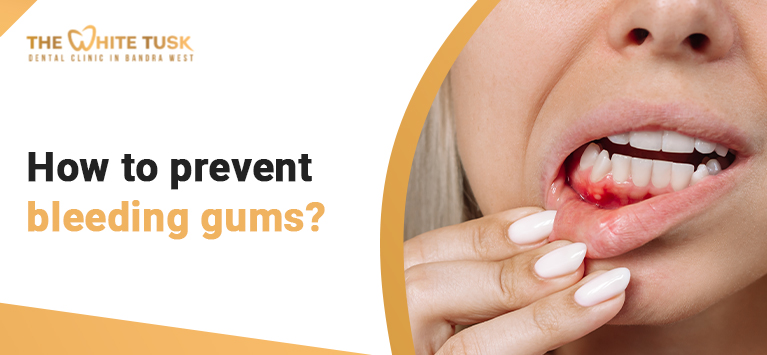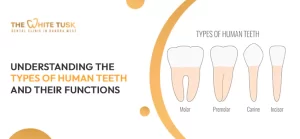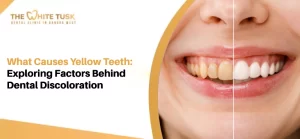
How to prevent bleeding gums?
Have you ever noticed your gums bleed for no apparent reason? There could be a serious reason behind the bleeding. If your gums are constantly bleeding, it could indicate periodontal disease or an unrelated dental issue. Sometimes, bleeding during brushing or flossing isn’t an issue. However, persistent bleeding needs to be addressed immediately. If this is left untreated, it can lead to severe dental issues like tooth loss or damage to the supporting system. In this blog post, we will explore effective ways to stop bleeding gums to improve your gum health.
Understanding the causes of bleeding gums:
Bleeding gums can be caused by various factors, ranging from minor issues to more serious underlying conditions. Gingivitis, which is characterized by gum inflammation, often develops due to the buildup of plaque along the gumline. Poor oral hygiene practices, such as inadequate brushing and flossing, can lead to the accumulation of plaque, increasing the risk of gum bleeding.
Other contributing factors include aggressive brushing or flossing, hormonal changes during life stages like puberty or pregnancy, certain medical conditions like blood disorders or diabetes, and vitamin deficiencies, especially in vitamin C, which can weaken blood vessels in the gums.
Additionally, medications with blood-thinning effects or changes in saliva composition, ill-fitting dental appliances like dentures, braces and other orthodontic devices, tobacco use, and chronic stress can also lead to gum bleeding. While occasional gum bleeding during oral care may not be problematic, persistent or recurrent bleeding indicates the need for professional dental attention to identify the root cause and administer appropriate treatment.
The Importance of Prompt Treatment:

Treating gum bleeding right away is essential for several reasons. It can help prevent dental issues from escalating, decrease the risk of complications, and avoid extensive interventions later on.
It’s also important to identify the cause of the bleeding, which can be due to poor oral hygiene, hormonal changes, medical conditions, or medications. Knowing the root cause can help manage and resolve the issue. Ignoring gum bleeding can lead to increased inflammation and discomfort and negatively affect your oral health. Quick treatment not only addresses immediate concerns but also promotes long-term gum health, preventing potential complications and preserving tooth integrity. Seeking professional dental care during the earliest signs of persistent gum bleeding is crucial for maintaining healthy gums.
Practical Tips for Gum Bleeding Prevention:

Practical tips for preventing gum bleeding involve adopting simple yet effective oral care practices to maintain optimal gum health. Here are some important tips to incorporate into your routine:
- Consistent Oral Hygiene:
- Brush your teeth at least twice a day using a soft-bristled toothbrush and fluoride toothpaste. Make sure that you clean all surfaces of your teeth very carefully and thoroughly.
- Regular Flossing:
- Floss daily to remove plaque and waste matter between teeth that your toothbrush might not reach. This helps prevent irritation and bleeding along the gumline.
- Gentle Brushing Technique:
- Avoid aggressive brushing, which can damage delicate gum tissue. Use gentle, circular motions, and choose a toothbrush with soft bristles.
- Antimicrobial Mouthwash:
- Rinse with an antimicrobial or fluoride mouthwash to reduce bacteria and promote gum health. Choose a product recommended by your dentist.
- Balanced Diet:
- Maintain a diet rich in vitamins and minerals, especially vitamin C, which supports gum health. Limit sugary snacks and beverages that contribute to plaque formation.
- Staying hydrated:
- It is essential to drink sufficient water to maintain hydration levels. Water helps flush away food particles and bacteria, contributing to a healthier oral environment.
- Regular Dental Check-ups:
- Schedule routine dental check-ups and cleanings. Professional cleanings remove plaque and tartar, preventing the development of gum disease.
- Address Underlying Health Issues:
- Manage systemic health conditions such as diabetes, as they can affect gum health. It is advisable to seek advice from medical experts to ensure suitable care.
- Quit Smoking:
- If you smoke, consider quitting. Smoking can compromise gum health and contribute to bleeding. Seek support if needed.
- Stress Management:
- Practice stress-reducing techniques, as chronic stress can impact oral health. Engage in activities like exercise, meditation, or hobbies to alleviate stress.
Incorporating these practical tips into your daily routine can significantly contribute to preventing gum bleeding and maintaining overall oral health. It’s essential to be consistent with these practices.
Seeking Professional Help:
Looking around for professional help after experiencing persistent bleeding is very important because dental professionals are trained to diagnose oral health problems, provide targeted treatment, and offer personalized guidance on maintaining healthy gums and teeth. Timely intervention not only addresses the immediate concern but also prevents potential complications, such as the progression of gum disease or tooth loss. Seeking professional dental care is crucial for preserving overall oral well-being
Take away
Maintaining healthy gums is crucial for overall dental well-being. By understanding the signs and causes and adopting preventive measures, individuals can actively contribute to preventing and addressing gum bleeding. Remember, your dental health is an integral part of your overall well-being, so prioritize it with care and diligence.







